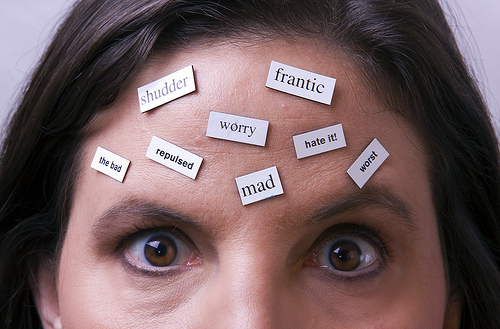Self Talk
 Self Esteem – What you tell yourself, and your beliefs about yourself, contribute in an obvious and literal way to your self-esteem. If you are feeling inadaquate and powerless, it’s very likely because you belive that you are. By the same token, you can raise your self-esteem simply by working on changing your self talk and basic beliefs about yourself.
Self Esteem – What you tell yourself, and your beliefs about yourself, contribute in an obvious and literal way to your self-esteem. If you are feeling inadaquate and powerless, it’s very likely because you belive that you are. By the same token, you can raise your self-esteem simply by working on changing your self talk and basic beliefs about yourself.
When you catch yourself engaging in self-critical or self-victimizing inner dialogues, follow these steps:
1.Disrupt the chain of negative thoughts with some method that diverts your attention away from your mind and helps you to be more in touch with your feelings and body. Any of the following may work:
-Physical activity (household chores or exercise)
-Taking a walk outside
-abdominal breathing exercises
-Five minutes of progressive muscle relaxation
-Snapping a rubber band against your wrist
The point is to do something that slows you down and gives you a bit of distance from your negative thoughts. It’s difficult to counter negative self-talk when you’re tense and your mind is racing.
2. Challenge your negative self-talk with appropriate questioning if necessary. Good questions to raise with your inner critic might be “What’s the evidence for this?’, “Is this always true?”, or “Am I looking at both sides of this issue?”
3. Counter your negative inner dialogue with positive, self-supportive statements. You may want to design your own positive statements specifically tailored to refute your critic’s statements one by one. Alternatively, you can draw positive counterstatements from a list of affirmations. I will discusss a list of affirmations in my next article.

 Self Esteem – Physical health and a sense of personal wellness, vitality, and robustness comprise one of the most important foundations of self esteem. It’s often difficult to feel good about yourself when you’re feeling physically weak, tired, or ill. Current evidence points to the role of physiological imbalances – often caused by stress in the genesis of panic attacks, agoraphobia, generalized anxiety, and obsessive-compulsive disorder. Upgrading your physical well-being will have a direct impact on your particular problem with anxiety as well as contribute substantially to self esteem.
Self Esteem – Physical health and a sense of personal wellness, vitality, and robustness comprise one of the most important foundations of self esteem. It’s often difficult to feel good about yourself when you’re feeling physically weak, tired, or ill. Current evidence points to the role of physiological imbalances – often caused by stress in the genesis of panic attacks, agoraphobia, generalized anxiety, and obsessive-compulsive disorder. Upgrading your physical well-being will have a direct impact on your particular problem with anxiety as well as contribute substantially to self esteem. Self Esteem
Self Esteem